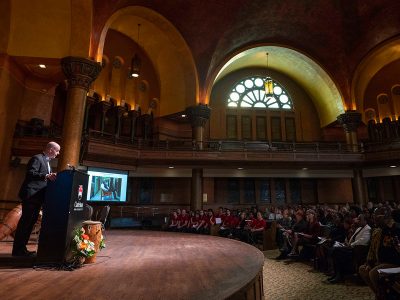Lead image by Shutterstock
By Ryan Atkinson
This article is republished from The Conversation under a Creative Commons licence. All photos provided by The Conversation from various sources.
Ryan Atkinson is a Postdoctoral Fellow at Carleton University where his research focuses on defence policy.
This year Montréal is set to become the home for the North Atlantic Treaty Organization’s new Climate Change and Security Centre of Excellence (CCASCOE). The CCASCOE, as the name would suggest, is set to provide specific expertise on the environment and the impacts of climate change for NATO security.
When announcing the new centre, Prime Minister Justin Trudeau declared it will “enable Canada, NATO allies, and other global partners to understand and address the serious security implications of climate change, including in the Arctic …[and]… it will contribute to Montréal’s status as a global hub for international organizations.”
The NATO centres of excellence (COE) system provides a valuable network of expertise to support innovation, and to “assist in doctrine development, identify lessons learned, improve interoperability and capabilities, and test and validate concepts through experimentation.”
Amid escalating geopolitical risks, Montréal’s new centre represents a strong commitment to climate security and will be crucial to promoting a co-ordinated global response that strengthens Canada’s capacity to address climate-specific concerns. As the federal government set out in a recent statement:
“Climate impacts may test the resilience of military installations and equipment, create harsher or more complex operational conditions, and change the nature of the strategic environment, which poses unique challenges for military and security entities charged with maintaining our security.”
The new centre is specifically designed to address these evolving concerns.
Climate security collaboration
In June 2021, the Canadian government proposed hosting the CCASCOE at a NATO Summit in Brussels. A year later it announced Montréal as the planned host city, with Canada providing $40.4 million in “direct support” for CCASCOE as host nation over five years.
The CCASCOE’s founding document governs “the relationship between participating countries and the Centre of Excellence” and was signed by Canada and 11 sponsoring nations.
NATO’s Allied Command Transformation ACT is responsible for establishing, accrediting and preparing the centres of excellence in co-ordination with the Supreme Allied Commander Europe.
The centres of excellence network provides a global array of expertise and practices that can benefit the development of the CCASCOE and facilitate information-sharing to climate change-related security capabilities. That ranges from the development of climate-related rapid response exercises to environmental disasters and other related engagements.
NATO has a long history of co-operation on doctrine development, which could serve as a valuable template for CCASCOE activities.
For instance, the Cooperative Cyber Defence Centre of Excellence (CCDCOE) in Tallinn, Estonia, provides “interdisciplinary expertise” through joint initiatives that include research, training and exercises. Meanwhile, the Crossed Swords exercise simulates adversaries’ perspectives to identify NATO’s own strengths and weaknesses.
Additionally, Locked Shields is a team exercise focused on “realistic scenarios, cutting-edge technologies and simulating the entire complexity of a massive cyber incident.”
These existing exercises could offer the CCASCOE a helpful framework to structure engagements supported by the existing centres of excellence network.
Another area where CCASCOE can lead innovation is through the hosting of exercises to train disaster-response capabilities for climate security challenges. An annual flagship exercise or a series of shorter practical workshops could support this leadership and help NATO members combat climate security challenges, build capacity and enhance public awareness.
Developing strategies
ACT’s Strategic Foresight Analysis 2023 report will update NATO’s understanding of the security implications of climate change to the alliance.
The update will highlight the importance of international co-operation to mitigate climate change, given that “strategic competitors may exploit disruptive changes, undermining alliances through false narratives and weaponizing critical technologies.”
At the Vilnius summit in June 2023, NATO released a series of climate strategy reports, including a climate security assessment, a collection of best practices and guidelines to measure greenhouse gas emissions for civilian and military infrastructure.
These initiatives emphasized the required civilian and military collaboration on climate security challenges — co-ordination that Canada and the CCASCOE are ideally placed to support.
Melting Arctic, rising tensions
This development occurs amid rising tensions.
The Arctic is predicted to experience the first September free of sea ice in history as early as the 2030s-2050s irrespective of emission scenarios. As a result, the Arctic will increasingly become more active and see increased demand for resource access, shipping routes and territorial claims. The increased activity and strategic significance placed on the Arctic will heighten geopolitical risk.
For example, in August 2023, Russia’s FSB Border Guard Service and China’s Coast Guard were reported to have increased co-operation in the northern port of Murmansk.
Russia and China have also invested in ice-breakers designed to increase a regional presence in the north.
These moves present serious challenges to the NATO alliance.
High on the agenda at this summer’s annual NATO summit will no doubt be the development of a co-ordinated approach to support climate security innovation. And in this regard, Canada — and the CCASCOE — will likely play an active role in developing this new strategic agenda.
![]()
Thursday, February 1, 2024 in The Conversation
Share: Twitter, Facebook



